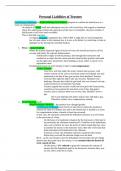Summary
Trusts Law - Personal Liability of Trustees Summary
- Module
- Trusts Law
- Institution
- Oxford University (OX)
Comprehensive summary/exam notes on personal liability of trustees in Trusts Law. This document covers the progression of the case law from Cocker v Quayle, to Target Holdings, AIB v Redler and beyond. It focuses on the question of whether the remedy of falsification is still available following th...
[Show more]



